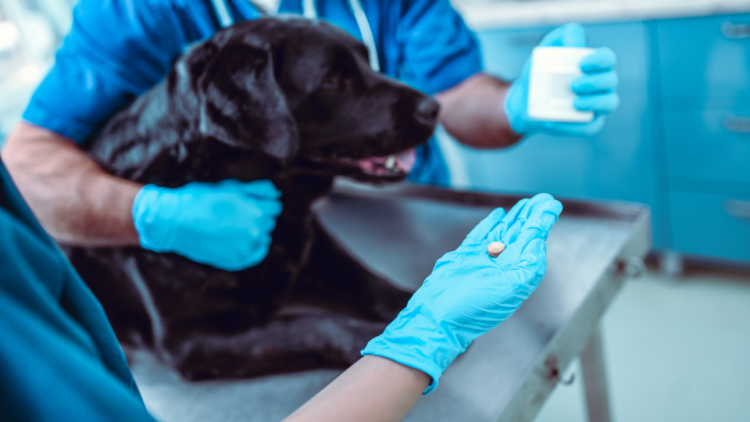Health conditions related to inflammation in dogs can result in several unpleasant symptoms, including pain and severe itching. Luckily, there are a few medications that can help with inflammation, two of the most common being prednisolone or prednisone for dogs. But, what's the difference between these two steroids?
Although prednisone and prednisolone are two distinct medications, prednisone must be converted into prednisolone by liver enzymes before the drug can work. Therefore, they’re considered to be pharmaceutical equivalents, meaning they have the same essential functions.
Keep on reading to learn about the uses, dosage, and side effects of these drugs in dogs.
Table of Contents:
- What is prednisone used for in dogs?
- Why use prednisolone for dogs instead?
- What is the right dose of prednisone for dogs?
- What are the side effects of prednisone for dogs?
- Risks of prednisone and prednisolone in dogs
- Potential drug reactions with other medications
- Can dogs overdose on prednisone?
- How to store prednisone and prednisolone
- Key Takeaways
Pro Tip: Prescription medications for pets can be quite expensive. If your dog has a chronic condition that requires ongoing care, the costs can quickly add up, which is why many owners try to find a pet insurance plan that covers prescriptions as well.
What is prednisone used for in dogs?
Prednisone is a prescription steroid used to treat a broad range of conditions in dogs. Many veterinarians prescribe the use of prednisone for dogs as an anti-inflammatory and immune suppressant.
Due to these properties of prednisone in dogs, the drug is highly effective at treating conditions such as:
- Allergic reactions
- Asthma
- Hives and itching
- Skin diseases
- Arthritis
- High calcium levels
- Orthopedic diseases
- Nervous system disorders
- Inflammatory bowel disease (IBD)
- Autoimmune diseases, including lupus and autoimmune hemolytic anemia (AIHA)
Additional uses of prednisone for dogs include replacement therapy for endocrine disorders such as Addison’s disease, as well as antineoplastic treatment for some neoplasia (cancer). It may also be used during emergency situations in response to spinal cord trauma, anaphylactic reactions, and several forms of shock.
Why use prednisolone for dogs instead?
Prednisone is converted into prednisolone in the canine’s liver, so although they are two distinct drugs, the names are sometimes used interchangeably. They are equally absorbed by the bloodstream and considered to be “bioequivalent” with the same essential functions. However, veterinarians may specifically prescribe prednisolone for dogs with poor liver function to avoid placing stress on the organ during the body’s conversion process.
Both drugs are forms of synthetic forms of corticosteroids - a hormone that occurs naturally in canines and humans - however, neither drug is approved by the FDA for animal use. Nonetheless, prescribing the “off-label use” of prednisolone and prednisone for dogs is considered accepted practice in veterinary medicine. Neither are available over the counter, so you will need a vet’s prescription to buy them.

What is the right dose of prednisone for dogs?
As with all off-label drugs, you must follow a veterinarian’s prescribed dosage very strictly. They will recommend a specific dosage of prednisone for dogs based on the animal’s unique weight and medical condition.
The steroid medication is usually administered orally in the form of tablets and liquid solutions, preferably with food to lower the chance of an upset stomach. If your vet prescribes dog prednisone once per day, it’s best to give it to your pet in the morning.
When prescribed more than once daily, it’s important to remember each dose and administer them in regular intervals. If you forget a dosage of prednisone for dogs, administer it as soon as you remember, unless it’s almost time for the next dose. In that case, continue with the schedule as planned because you should never give your dog two doses at once.
Some skin conditions, such as dermatitis and hives due to allergies, may be treated with a topical steroid cream. More severe conditions, including anaphylactic shock and Addisonian crisis, may require a steroid injection in a hospital setting. The medication takes effect quickly, usually within one to two hours, and improvement in symptoms should soon follow. It’s a short-acting drug that typically stops working within 24 hours, but the effects last longer in dogs with kidney and liver disease.
It is important to know that Prednisone should never be stopped abruptly so if your dog is prescribed this medication by a veterinarian you need to follow the instructions carefully. Most veterinarians will prescribe it as a taper course that needs to be followed strictly.
Your vet might monitor your canine companion to ensure that the medication is working properly. Recommendations related to monitoring will depend on several factors, including the condition being treated, duration of therapy, size dosage, and the dog’s overall health. Common monitoring practices with these medications include:
- Bloodwork and urinalysis
- ACTH stimulation tests
- Blood sugar levels
- Signs of swelling
- Appetite and weight changes
- Potential adverse reactions
What are the side effects of prednisone in dogs?
The most common side effects of prednisone (prednisolone) in dogs include increased appetite, increased thirst, and increased urination.
During long-term use and when the steroid is taken in higher doses (for instance, in an emergency setting or for the treatment of autoimmune diseases), side effects can also include diarrhea, vomiting panting, and behavioral changes including aggression.
More serious adverse reactions include:
- Digestive tract ulceration (which can manifest through bloody vomit, bloody or black stools, loss of appetite, and high fever)
- Dry hair or hair loss
- Weight gain
- Abdominal distension
- Muscle weakness
- Cushing’s disease
- Addison’s disease
- Lipid elevations
- Urinary tract infections
- Diabetes
- Heart problems

Risks of prednisone and prednisolone in dogs
Prednisone and prednisolone should not be given to dogs with allergies to the drug, as well as to those with systemic viral infections, fungal infections (with the exception of Addison’s disease), Cushing’s disease, tuberculosis, or ulcers.
These medications should be used with caution in dogs with heart disease, diabetes, cataracts, osteoporosis, kidney disease, increased blood pressure, and other types of infections. Prednisone and Prednisolone should also be used cautiously in puppies as they can inhibit growth, as well as in pregnant or nursing dogs.
The medications should not be given to dogs that are to undergo allergy testing within the next month. Animals receiving prednisone or prednisolone might be more susceptible to viral and bacterial infections. These drugs can also mask signs of infection, like elevated temperature.
Prednisone should not be used in dogs with liver dysfunction as they’re unable to efficiently convert it to prednisolone.
Don’t stop administering these medications abruptly, especially if your dog has been receiving high doses or has been on the drug for a long time, as this can have serious consequences. Consult your veterinarian about how to taper dogs off prednisone slowly to avoid complications.
Potential drug interactions with other medications
Prednisone and prednisolone might react with several different medications, including:
- Other steroid drugs
- NSAIDs like aspirin, Carprofen, Etogesic, Deramaxx, Metacam, Novocox, and Previcox
- Anticholinesterases,
- Amphotericin B
- Barbiturates
- Cholestyramine
- Cyclosporine
- Cyclophosphamide
- Estrogens
- Ephedrine
- Fluoroquinolones
- Diuretics
- Digoxin
- Insulin
- Mitotane
- Mycophenolate
- Macrolide antibiotics
- Phenobarbital
- Rifampin
- Ketoconazole
- Warfarin
If prednisone or prednisolone is used concurrently with other medications prone to causing ulcers, like NSAIDs, the risk of stomach ulcers might increase. Prednisone and prednisolone might also interact with lab tests, including allergy tests, as well as potassium, urine glucose, cholesterol, and thyroid levels.
Use caution when on a large dosage of prednisone for dogs, as vaccines might be less effective or result in infection. If possible, vaccination should be delayed. Prednisone and prednisolone might increase insulin requirements in dogs with diabetes.
Make sure to let your vet know about any drugs, supplements, or vitamins your dog is taking.
Can dogs overdose on prednisone?
A prednisone overdose in dogs can cause itching, weakness, loss of hearing, depression, anxiety, increased blood pressure, heart problems, and seizures. That’s why it is very important to follow your veterinarian’s dosage instructions.
If you suspect your dog has eaten these medications inadvertently or was accidentally overdosed, contact your vet or the Animal Poison Control Center right away. If possible, bring the prescription container with you when you take your dog for treatment.
How to store prednisone and prednisolone
The tablets should be stored at room temperature (between 59°F and 86°F), in a tight container, and away from light. Liquid forms of the drug should be stored following the label on the bottle.
Make sure you keep these and all other medications out of reach of your children and pets. Use Prednisone and prednisolone according to your vet’s instructions and only give them to the pet for which they were prescribed. These drugs are not for human use.
Pro Tip: The cost of pet insurance helps to cover the unexpected expenses that come up with pet health care, whether that’s an illness or an accident. Pet insurance policies include coverage for medically necessary vet treatments, including diagnostic testing like blood work, x-rays, prescription medications, hospitalization, including any treatments while in the hospital, and surgeries.
Key Takeaways
- Prednisone and prednisolone are corticosteroid drugs commonly used to treat inflammation, allergies, autoimmune diseases, and some forms of disease.
- While generally safe and effective when prescribed by a vet, these drugs can cause an adverse reaction in dogs. Common side effects include vomiting, increased appetite, increased thirst, panting, restlessness, etc.
- The proper dose of prednisone in dogs will vary depending on several factors, including the medical condition being treated, but owners should always follow the instructions provided by a veterinarian.
- If you need more information about these drugs or suspect an accidental overdose, be sure to contact your vet immediately.
